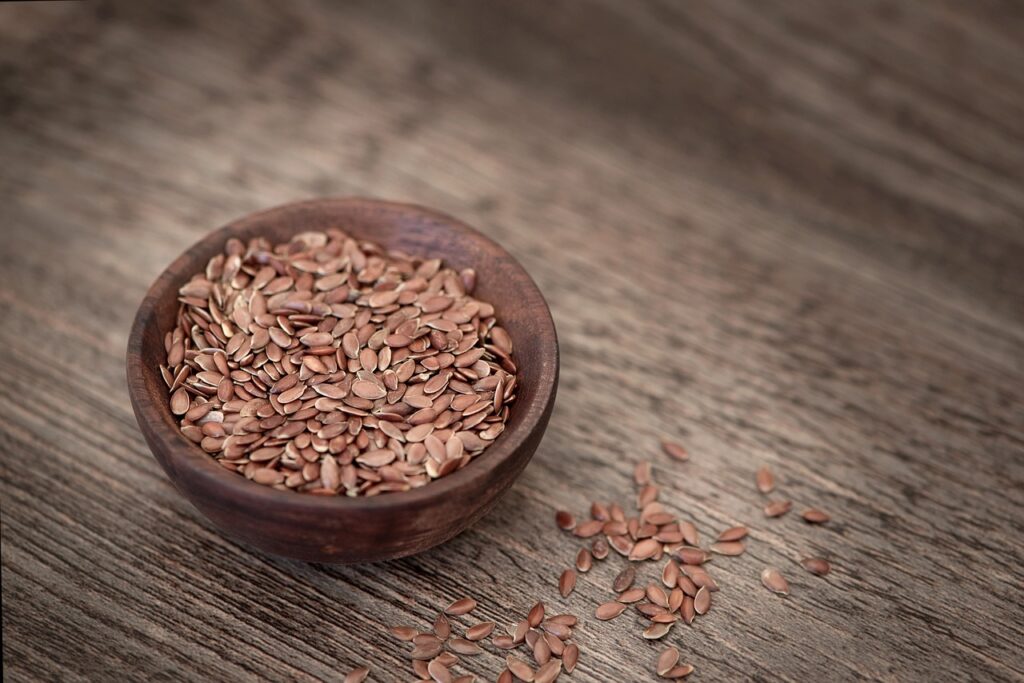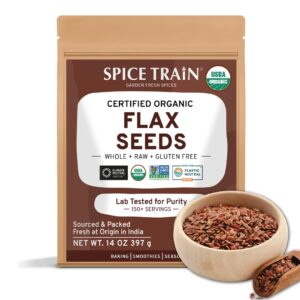Flax Seed Super Food
Flax seeds, also known as linseeds, are small, golden, or brown-colored seeds that are packed with a variety of nutrients and health benefits. They have been used for thousands of years in various cultures for their medicinal properties. They are now gaining popularity as a superfood due to their high levels of fiber, protein, and omega-3 fatty acids.
-

Flax Seeds
1. Flax Seeds Composition
- Fiber: an excellent source of fiber, with two tablespoons providing around 8 grams of fiber, which is approximately one-third of the daily recommended fiber intake. This fiber is important for digestive health, as it helps to regulate bowel movements and prevent constipation.
- Protein: Good source of protein, with two tablespoons providing around 4 grams of protein. This protein is important for building and repairing muscles, as well as supporting overall health and wellness.
- Omega-3 Fatty Acids: One of the richest sources of omega-3 fatty acids, which are essential fatty acids that the body cannot produce on its own. Omega-3 fatty acids are important for heart health, as they can help to reduce inflammation, lower blood pressure, and reduce the risk of heart disease.
- Lignans: A rich source of lignans, which are phytoestrogens that have been shown to have anti-cancer properties. Lignans may also help to regulate hormones, improve bone health, and reduce the risk of breast cancer.
2. Health Benefits
- Heart Health: These seeds have been shown to improve heart health by reducing inflammation, blood pressure, and heart disease risk.
- Cancer Prevention: A rich source of lignans, which have been shown to have anti-cancer properties. Lignans may help to prevent the growth of cancer cells and reduce the risk of breast cancer.
- Improved Digestive Health: Seeds are an excellent source of fiber, which is essential for digestive health. Fibre helps to regulate bowel movements and prevent constipation, as well as reducing the risk of colon cancer.
- Weight Management: A low-calorie food that can help to regulate appetite and promote weight loss. The high fiber content of flax seeds can help to reduce hunger and promote feelings of fullness, while the protein content can help to build and repair muscles.
- Improved Bone Health: A rich source of lignans, which have been shown to improve bone health by reducing the risk of osteoporosis and improving bone density.
3. How to Incorporate Flax Seeds into Diet
- Add to smoothies: These seeds can be easily added to smoothies, where they will blend in undetected and add a boost of nutrition.
- Bake with flax seeds: These can be added to baked goods, such as muffins, bread, and cookies, to add a crunchy texture and a boost of nutrition.
- Sprinkle on salads: These seeds can be sprinkled on salads for a crunchy texture and a boost of nutrition.
- Mix with yogurt: Also these can be mixed with yogurt for a healthy snack or breakfast option.
4. Use of flax seeds by the Pharma Industry
The pharmaceutical industry is currently using these seeds to produce various health supplements and functional foods. Some of the most common uses of flax seeds in the pharmaceutical industry include:
- Omega-3 Supplements: Flax seeds are a rich source of omega-3 fatty acids, which are essential fatty acids that the body cannot produce on its own. Omega-3 supplements made from flax seeds are used to support heart health, reduce inflammation, and improve overall health and wellness.
- https://amzn.to/40GSMn3

- Fibre Supplements: Flax seeds are an excellent source of fiber, and fiber supplements made from flax seeds are used to regulate bowel movements, prevent constipation, and support digestive health.
- Menopause Supplements: A rich source of lignans, which have been shown to have anti-cancer properties and regulate hormones. Menopause supplements made from flax seeds are used to alleviate symptoms of menopause and improve overall health and wellness.
- Weight Management Supplements: Seeds are a low-calorie food that can help to regulate appetite and promote weight loss. Weight management supplements made from flax seeds are used to support weight loss and improve overall health and wellness.
- Bone Health Supplements: They are a rich source of lignans, which have been shown to improve bone health by reducing the risk of osteoporosis and improving bone density. Bone health supplements made from flax seeds are used to support bone health and improve overall health and wellness.
It is important to note that while these seeds have numerous health benefits, they should not be used as a substitute for conventional medical treatment or advice. Always consult with a healthcare professional before taking any new health supplements or functional foods.
5. Side Effects of Flax Seeds
Yes, consuming it can have some side effects, although they are generally considered to be safe when consumed in moderate amounts. Some of the most common side effects of consuming flax seeds include:
- Digestive Issues: Consuming large amounts of flax seeds can lead to digestive issues such as bloating, gas, and constipation. This is because the seeds are high in fiber, which can be difficult for some people to digest.
- Interactions with Medications: These seeds contain compounds that can interfere with the absorption and effectiveness of certain medications, such as blood-thinning medications and hormonal medications.
- Allergic Reactions: Some people may be allergic to flax seeds, and consuming them can lead to symptoms such as itching, hives, and difficulty breathing.
- Increased Risk of Estrogen-Sensitive Cancers: Seeds contain lignans, which are compounds that can mimic the effects of estrogen in the body. For women at an increased risk of estrogen-sensitive cancers, consuming large amounts of flax seeds may not be recommended.
It is important to note that these side effects are generally rare and only occur when flax seeds are consumed in large amounts. If you are considering incorporating flax seeds into your diet, it is recommended to start with a small amount and gradually increase the amount over time. Additionally, it is always a good idea to consult with a healthcare professional before adding any new food or supplement to your diet.

DISCLAIMER: The contents of this article are intended to raise awareness about common health issues and should not be viewed as sound medical advice for your specific condition. You should always consult with a licensed medical practitioner before following any suggestions outlined in this article or adopting any treatment protocol based on the contents of this article.
Egg Substitutes and How to Use These Remarkable Commodities in 2024


